Something happened in the 90's that ruined music ever since...
As a teacher of a music composition class, there comes a time when I give some classes about common chord progressions. A useful set of tools for beginners to work with. Today I stumbled across this useful website called Hook Theory. It has a bunch of cool resources, but one series of infographics caught my attention.
Each infographic analysed the chord progressions of top chart songs in each decade since the 60's, as well as some individual artist albums and their track-by-track chord progression analysis. It's nothing I didn't know, tbh, but seeing it laid out was pretty interesting to see.
There's often this argument that 'music ain't what it used to be', how it's targeting the lowest common denominator, simplifying to the point of retardedness. And then a counter-argument that mostly consists of 'ok boomer', saying anyone who claims that is simply out of touch.
But the claim that music is getting simpler is an uncontrovertible fact, to the point that numerous research papers confirm it. Not that a research paper is even necessary. Let's face it, we all know it's true. It just makes business sense. Whittle things down to the simplest, easiest and most profitable formula, and go with it. That's the way of the capitalist world.
Of course, non-pop music can be discovered that's still being churned out and some artists are more intelligent and artistic than the world has ever seen... but the casual listener never hears from these folk.
Now I know, I know. The number of chords doesn't alone determine quality, that's elitist snobbery in and of itself, but it is generally a pretty good indicator of the effort and level of musical knowledge that went into the creation of the music to begin with.
Anyway, below is the infographic provided for the 1970's top chart songs and their chord progressions. They've been helpful with colours per chord, so if you know nothing about music, just take note of how colourful it all is:
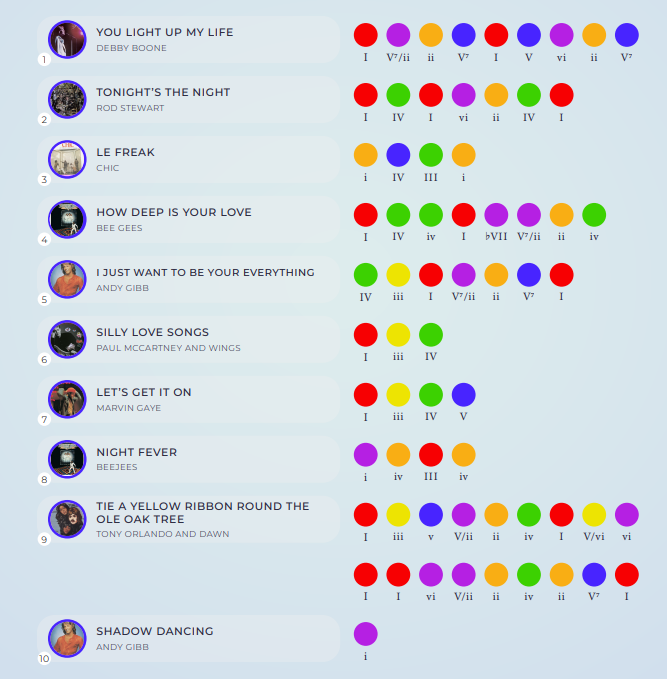
Some are 3 or 4 chords, but most are far more, with number 9 churning out an 18-chord cycle.
It also depends on the type of chords used. Rather than simply using chords from the 7 choices in any given key signature, but anyone with an ounce of musical knowledge can borrow chords from other keys for artistic purposes, which you can see with slash chords in the image above (e.g., 'V7/ii') and open up the musical world to an infinite journey of harmony.
These progressions are also often only snippets. How Deep is Your Love, for example, only shows 8 chords, while the full song has more like 28 chords, all of which have those slash chords, borrowed chords, chords with extra jazzy notes and the like.
You can see it's quite similar in the 1980's, perhaps even more pronounced in complexity:
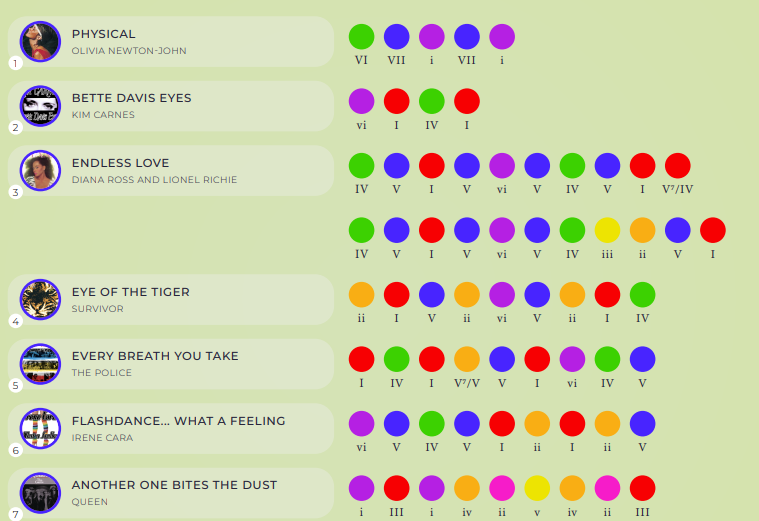
The same can be said for the 90's, but...
...then something happened.
It's hard to really explain what series of events occured, but it was around the 90's where things started to take a shittier turn, and people with actual musical prowess started dwindling in demand.
Take a look at the 2000's:
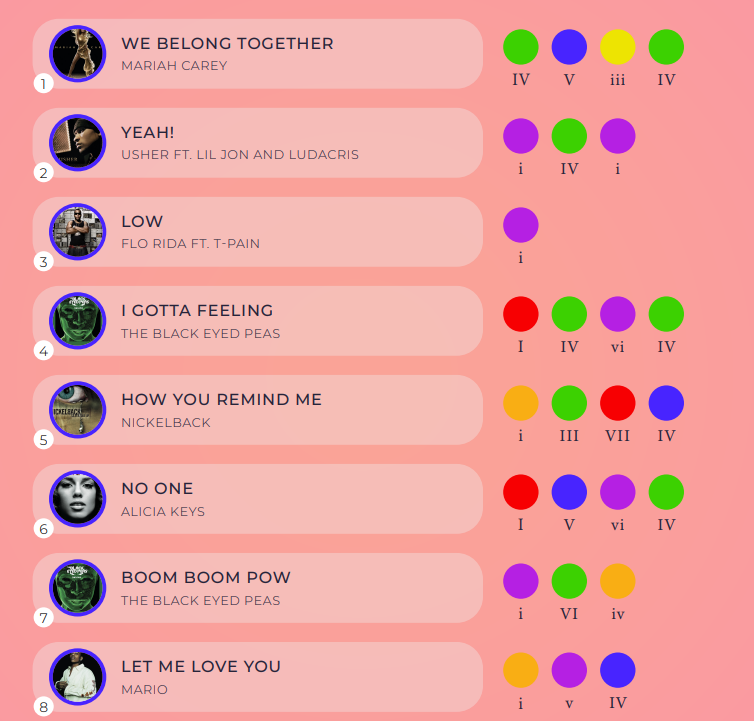
Not only has the average progressioin capped to a maximum of 4 chords, but those chords have gotten simpler with none of those slashes or anything other clever techniques. (Thanks Nickleback).
Well, after a decade of that you'd think we'd have gotten bored and thirsted for something more. But no. Behold the 2010's, also known as more 2000's:
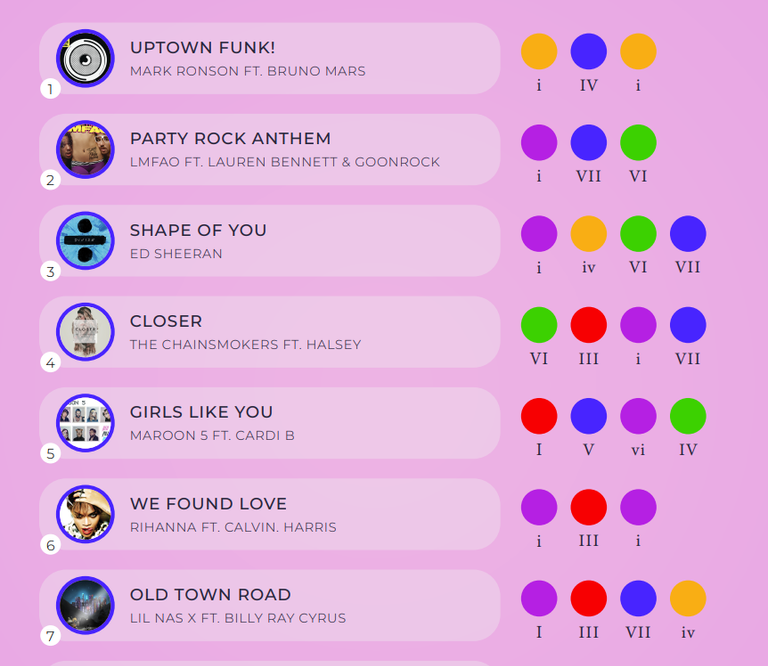
Depressing.
And it's not like the 2020's has enjoyed some magical musical renaissance, either.
Clearly the hottest selling artist right now has for a while been Taylor Swift, including in the 2010's. Her 2012 album, Red, track by track, looks like this:
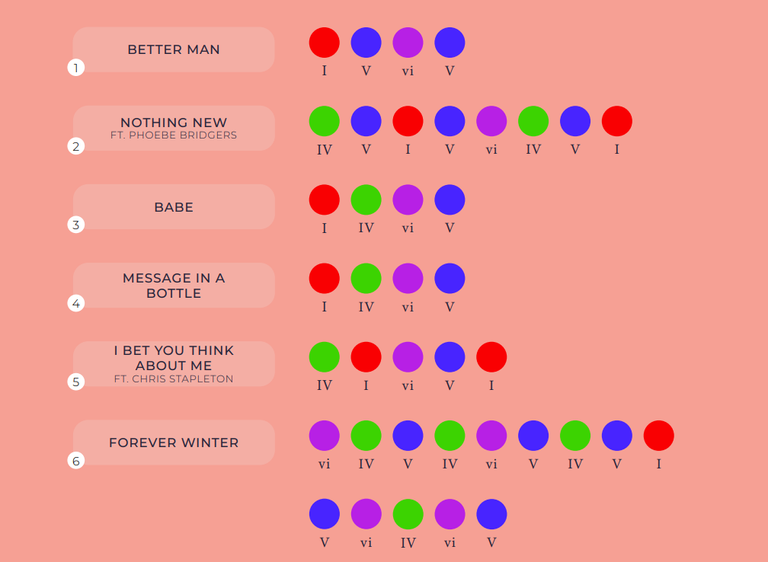
You might be thinking 'oh, some have many chords'. But a closer inspection shows something of a disease that has perpetuated the entire industry. The curse of the I V vi IV (chords 1-5-6-4, or Do, So, La, Fa)
If you know your roman numerals - or coloured circles - you'll notice the same chords over, and over, and over again. Two tracks are identical back to back, red - green - purple - blue. Others are basically the same thing in a different order; red - blue - purple - blue.
The chords 1 - 5 - 6 - 4, in pretty much any arrangement, are insanely oversaturated, to the point that there's even a viral music video demonstrating just a single arrangement of those chords applies to almost every single hit song imaginable.
These songs borrow no chords from other keys, they don't invert chords or extend them with other notes, nothing. Just those basic chords in their raw, kindergarten-level format, churned out over and over since the 90's decided for whatever reason to get rid of anything interesting.
Ed Sheeran's album analysis does marginally better, and Billie Eilish is championing the movement to more interesting music when compared to anyone else, but again, only marginally.
Compare the above to some more classics, such as Bowie's Life on Mars:




Just look at this treasure trove of 30-something chords!!
Slash chords, 7 chords, 9 chords, augmented (+) chords, visiting new keys, chromatic movement, secondary domintants...
And this song is considered a timeless classic, known even to my teenage students in China. It's catchy, memorable, easy to sing along to.
Why obsess over chords?
The thing is, one's ability to create progressions is a direct reflection of one's effort, knowledge and thought process. If you want medical aid, you'd hope to get a doctor who knows something about medicine. Likewise, if I want good music, It's my hope that the musician knows what chords are and what to do with them. They are the backbone of any given music.
Music tends to tell a story or portray a message. Traditionally, art forms tell these stories through their particular medium. In visual art, that's paint or other materials which we see with our eyes.
If visual art was reduced to the point that every artist just wrote a message with black Times New Roman font on a white piece of A4 paper strung up on the walls of galleries, we'd consider that a lost art. No artistic training is necessary to produce such a 'work', and it really appeals to nobody except the odd post-modern poet.
Likewise, music has been stripped of its paint and brush. Now, anybody with a computer can make a hit single providing they have a good marketing team. No skills required.
A good piece of literature carves an intricate narrative arc that often gets stripped down in analysis to the opening, the main body, the climax and the resolution, which might be portrayed in school as something like this:
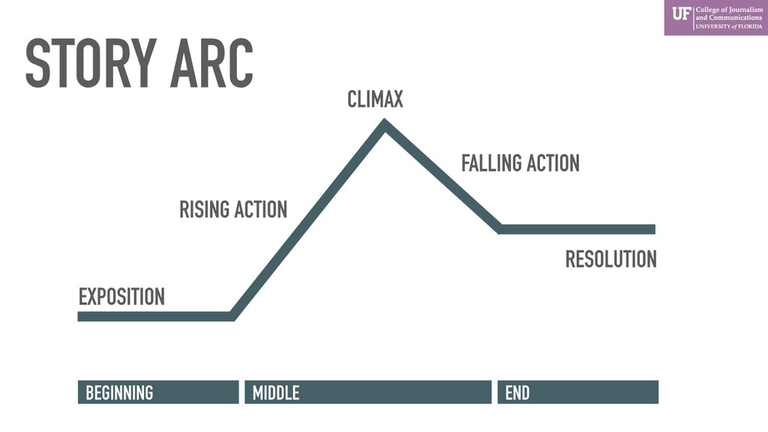
If you use the same chords across this entire arc in music, you are essentially stuck in the exposition stage, without ever moving to a climax or resolution.
Now, these are lazily done with digital production methods instead; the additive process of more volume, more sounds, louder, higher singing. But it's ultimately just the exposition, just bigger. Baiscally, more like this:
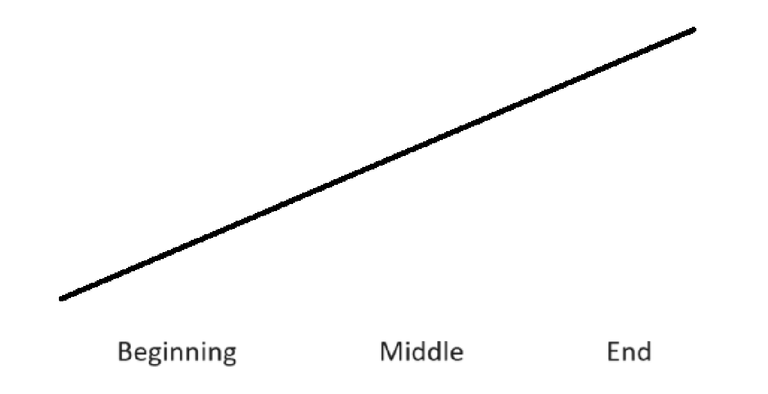
Or, more often than not, like this:

Life on Mars tells a story I don't wish to attempt to draw on MSPaint, in which musical knowledge is used to express forward motion, a climax (is there life on Marrrrrrssssssss?) which eventually resolves back to the exposition.
The harmonic progression helps push that story forwards, creating growing tension and expectation until the climax you've been anticipating for so long finally hits. It's a masterpiece, and one that took a lot of knowledge and experience, novel ideas, creative thought, and RISK.
Now, no RISK is permitted. Everything must be a hit, and to accomplish that, everything must adhere to the tried and tested formulae. This of course isn't only true in music. Comedy legend John Cleese has said the exact same thing when comparing today's TV media to when he was a creative. He could get a budget convincing people that he had no idea what he was going to do, but they had faith in his ability. Nowadays, impossible.
Anyway
I guess the lesson is, if you listen to mainstream music, try not doing that, and spend a little time diving deeper into streaming platforms or whatever, go down some musical rabbit holes until something strikes you as incredible, even if you don't really focus on music and just have it as background nosie. It might take time - Something like 150,000 new songs are released onto places like Spotify every single day, 140,000 of which are likely utter garbage trying to pander to the same model as the mainstream top 0.1%.
But it's worth it in the end. Your life will have a new artistic element to it which strips away some of that cold, concrete grey of the world and exposes a little bit of colour you forgot existed. It's honestly what keeps me going!
Maybe start with some long lost classics, such as legendary Earth Wind & Fire's 'After the Love has Gone', which has probably over 50 chords going on, and overwhelmingly intelligent utilisation of 'em, too:
If we support better music, we won't have to worry about AI taking over, right? If we don't, then I fully support AI music, because it's basically no frickin' different to what we're already doing.
I read this twice, and for would read again i want learn how make My own músic. And having all this on mind make make overthink about it haha, cheers bro great post.
Wow a double read, special!
Everyone has to start somewhere, eh? Start with one of the simple chord progressions and whistle over 'em =D Easy peasy. thanks for dropping by!
That's interesting. I should have this script made for my weekly #newtunes posts. :)
That would be pretty interesting for someone like me, for sure ^__^
The significant degradation of the fidelity of sound in consumer electronics can also be mentioned. Older systems sound profoundly better.
This is sadly not something I'm that well versed in. Living abroad gives me this perpetual mindset of never buying anything hi quality, in this case, speakers, vinyl etc, because it'll be a nightmare to move when I leave back home.
Although I admit it's mind boggling MP3s still dominate the land!
There was a period at the peak of the 'loudness wars' where everything in hindsight just sounds utterly terrible. RHCP's 'californication' album is so overcompressed I can barely listen to it anymore. Same with Muse and many more of that period.
Thankfully this at least has been refined.
Fantastic observation. Every time I perform a harmonic analysis I love to identify the different cadences. The plague cadence is my favorite. I congratulate you on this exquisite and unique work.
!LUV
!PIZZA
Thanks!
Yeah plagal was always such a pleasant one for me, feels so heavenly. V-I is too common, gotta be real creative to keep it fresh heh.
There's a great song by Owl City called 'This isn't the end' I think. the chord progression is just a string of cadences one after the other, which I thought was pleasantly unique:
I - IV - I - IV - V - IV - V - vi - IV - V - I (roughly)
so that's... Plagal --> Half --> Deceptive --> Authentic
$PIZZA slices delivered:
@yisusth(1/5) tipped @mobbs
Congratulations @mobbs! You have completed the following achievement on the Hive blockchain And have been rewarded with New badge(s)
Your next target is to reach 85000 upvotes.
You can view your badges on your board and compare yourself to others in the Ranking
If you no longer want to receive notifications, reply to this comment with the word
STOPfantastic post!
@tipu curate
Upvoted 👌 (Mana: 60/70) Liquid rewards.
Do you want to get involved? Do you want to support music and this project? Follow us to keep you updated and read our Introduction post!
🎶 Join us on our Discord Server! 🎵
Just waooo. Greetings friend @mobbs the truth is that I am not a specialist in the subject but I believe that human actions are turning in a common aspect that responds to generate the minimum of efforts.
As a man of science I realize that young people now bet on things fast and without quality and this is a reflection that we see even in the economy of some countries, hence, I associate it as a common denominator that extends to social level and that affects in some ways the progress we have been developing.
Excellent material that you share with us. Greetings
This is the exact point I would have led too if I didn't realise I already wrote too much - the corporate enterprise really works hard to make it efficient for the corporate machine, and humans are essentially tagging along for the ride, not realising that the system is not being catered towards them, but lifeless corporations... dangerous
Interesting point of view and argument. Nice, nice post, @mobbs
Nice breakdown! Exciting reading